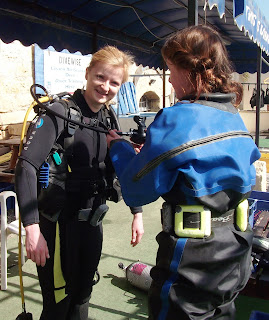 Bit of a more serious blog today. We have a Rescue course on at the moment which is brilliant news. The Rescue course doesn’t seem to be as popular as the Open water course and the Advanced course. Many divers seem to opt for specialities over doing a rescue course so they can dive deeper, penetrate wrecks, increase their no deco time, explore dive sites at night which gives them the opportunity to see some crazy creatures you don’t get to see during the day, improve their buoyancy, ect.
Bit of a more serious blog today. We have a Rescue course on at the moment which is brilliant news. The Rescue course doesn’t seem to be as popular as the Open water course and the Advanced course. Many divers seem to opt for specialities over doing a rescue course so they can dive deeper, penetrate wrecks, increase their no deco time, explore dive sites at night which gives them the opportunity to see some crazy creatures you don’t get to see during the day, improve their buoyancy, ect. 

 These courses obviously benefit the diver by allowing access to a greater range of dive sites and so improve their diving experience. This probably makes specialities more popular because of the personal benefits they bring to the individual.
These courses obviously benefit the diver by allowing access to a greater range of dive sites and so improve their diving experience. This probably makes specialities more popular because of the personal benefits they bring to the individual. A rescue course doesn’t do that directly. Rescue course are designed to make divers more aware of others and their safety. It may seem like the rescue course does not benefit the individual unless it is their buddy, or another diver, that has taken the time to do this course and so knows what to do when something goes wrong.
However the skills they learn on the rescue course do actually benefit the individual as well, though few divers realise this until they have taken the course. The course makes you aware of the types of things that can go wrong, the more familiar you are with what causes problems on a dive the greater your ability to anticipate these problems in a given situation, often even before you have got in the water.
Think back to when you have encountered a problem on a dive. Assuming that you have, if you think about it properly you will probably realise that your instructor or Dive master pay a lot of attention to how you have put on your equipment, how the equipment fits, the weather conditions and how you feel and behave before a dive.



So the course does benefit you as an individual as you can spot potential problems and either solve them straight away or plan a solution to deal with them if they happen. If every diver stopped their training at the Advanced level then the chance that there will be someone available who knows how to respond to a diver emergency gets slimmer and slimmer. Divers shouldn’t depend on someone else to take the rescue course for them, they should take the rescue course to make themselves a more responsible diver and even if others do not take the course you may find that your good habits may start to be adopted by other divers around you especially if you give a reason for what your doing.
After all safety is the bottom line when it comes to diving. If you don’t feel safe you won’t enjoy the dive.


No comments:
Post a Comment